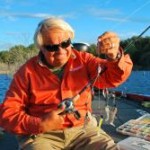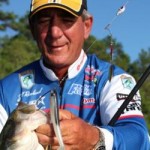How To Catch Shallow Fall Bass On Castable Umbrella Rigs Like the Alabama Rig
Fall brings many changes to a bass’s world. Cooling water temperatures prompts them to move to shallow water again, and concentrates the baitfish in big schools that move from the main lake to tributaries and coves. Bass follow these buffet lines, and there’s no better way to catch them than with a downsized castable umbrella rig (CUR).
Though umbrella rigs are usually thought of as deep water baits, some old pros like Jimmy Houston–and young ones like Jason Christie–have learned the right umbrella rig can be deadly in shallow water.The bait-school look is a natural in the fall as shad and other forage come together. Schooling baitfish are what bass are feeding on. Mimicking a school is easy, but fishing shallow with a CUR is a new technique for bass anglers. Most rigs are big, heavy and nearly impossible to fish in water less than 6 feet deep without snagging on bottom, but several downsized, lightweight versions stack up shallow water bass.
Several factors affect the depth any given CUR will run: overall weight, the resistance it creates when retrieved, and external factors like line size and type, retrieve speed, and the angle you hold the rod. In general, the lighter the overall package, the shallower it is capable of running. Resistance refers to how easily the rig cuts through the water, and the pull created by any spinning blades and the swimming motion of multiple swimbaits. The more resistance from blades and baits, the higher in the water column the rig will run.
When external factors are considered, a braided superline is thin-diameter and prompts the lure to run deep. Heavy monofilament or copolymer line keeps it higher in the water column. To keep a rig as shallow as possible, use heavy monofilament, engage the reel immediately when the rig hits the water and hold the rod at the 12 o’clock or 1 o’clock position.
The YUM Flash Mob Jr. (FMJ) was the first version to see success on the bass tournament trail when fished in shallow water. Oklahoma’s Jason Christie used the FMJ to catch the winning bags in the FLW Tour event on Beaver Lake April 11-15, and said most of his fish came out of just 4- to 7-feet of water.
The FMJ features four willowleaf blades positioned halfway down each of the outer arms, and they aid in providing water resistance that keeps the rig shallower than others. When rigged with 1/8-ounce jigheads and swimbaits, it’s easy to keep it working the top portion of the water column.
Bass feeding on baitfish during fall may be holding in 20 feet of water, but when they’ve got the baitfish pinned against the surface the bass are only a few feet under the surface. Run a lure under the fish and you might as well be fishing on the moon. Any time you see schooling activity you can catch those fish with a lightweight CUR fished just below the surface.
Soft-plastic bait selection for the FMJ includes curly tail grubs and swimbaits up to 5 inches in length. When fishing for schooling bass in open water during fall, most pros suggest using swimbaits that match the size of the forage, but larger swimbaits slow the sink rate and allow anglers to fish the rig higher in the water column.
BOOYAH Bait Company’s new Boo Series of rigs are available in ¼-, 3/8- and ½-ounce weights, and feature a flexible lure arm that gives anglers something no other CUR can – the ability to use any lure they want on the business end. The flexible wire allows crankbaits and other lures with built-in swimming action the freedom to move as designed. A buoyant shallow-running crankbait keeps the rig closer to the surface than when used with a sinking lure such as a jig and swimbait.
The Boo Rig features four stiff outer arms with willowleaf blades attached surrounding the longer lure arm. The Boo Teaser is the same basic design, but with bait-keeper screws and teaser curly tail grubs instead of blades on the outer arms. The Boo Spin is a flexible spinnerbait that you customize with any lure as the body.
Zell Rowland likes rigging a single lure weedless on a castable umbrella rig for fishing around weeds and other snaggy cover.B.A.S.S. Elite pro Zell Rowland was one of the first anglers to test the new rigs prior to introduction. On the small lake he was on, the fish were in shallow shoreline weeds, which posed several problems. In addition to needing to keep the rig just a foot or so deep, the shoreline vegetation meant the rig could not feature any open hooks.
“A lot of times in this situation I’ll go to a YUM Money Minnow on an unweighted or very slightly weighted Texas rig,” he said, “especially if there’s any ‘gunk’ up there with the weeds. If it was just clean weeds I’d throw a spinnerbait, but any moss fouls the bait.”
Rowland decided to combine the best characteristics of a spinnerbait and a weedless Money Minnow on the Boo Spin. He first Texas rigged the swimbait on an unweighted wide-gap hook before adding it to a ¼-ounce double willow Boo Spin. This lightweight combo fishes as shallow as a small spinnerbait.
Because the Boo Series features flexible wire, it’s possible to fish a buoyant crankbait behind one of the lighter Boo Rig or Boo Teaser Rig and get that effective bait school look while keeping it in the top portion of the water column. A square lip bait like the original Cordell Big O or XCalibur Xcs100 series keeps the rig up and allows anglers to slow down retrieves.
The rig/square-lip combo really shines when fishing for schooling bass in the fall. With the buoyancy of the bait fighting the natural sinking action of the rig, it’s possible to slowly work the school while keeping the rig in the upper portion of the water column.

